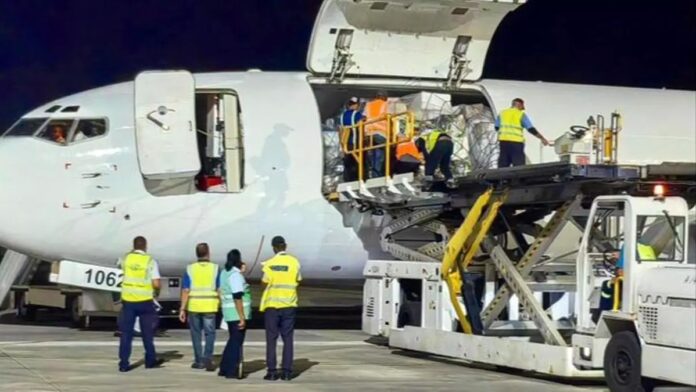
The donated generators run on oil or propane, so they are not practical amid the fuel crisis on the island.
By 14ymedio
HAVANA TIMES – The US organization The People’s Forum has donated 100 electric generators to Cuba that, according to Miguel Diaz-Canel, will be destined for “hospitals, polyclinics and other public service institutions in Guantánamo, Artemisa, Mayabeque and Havana.” The president thanked the NGO that since the passage of Hurricane Oscar in October has managed to raise 250,000 dollars in three weeks to buy aid for the Island.
Diaz-Canel published photos of the generators being unloaded from a plane, thanks to the “solidarity of the American people.” The generators, of the Firman brand, have an approximate value of 1,400 dollars each (140,000 dollars in total) and run on oil and propane, which makes them impractical in the midst of the hydrocarbon deficit that the Island suffers.
“The most recent shipment contains 54 generators that will be sent to the areas affected by Hurricane Rafael. So far, this campaign has delivered more than 100 electric generators and more than 60,000 pounds of food, providing vital relief at a time when Cuba was in need due to a general blackout followed by two hurricanes in just two weeks,” said The People’s Forum in a statement.
The NGO – which has called its campaign “Let Cuba Live” – denounced the “triple threat” posed to Cubans by the blackouts, hurricanes and the “blockade of the United States,” and called on Joe Biden’s Administration to use “the time it has left” to avoid new sanctions by President-elect Donald Trump and remove Cuba from the list of countries sponsoring terrorism.
Last October, after the first total blackout, Washington said it did not rule out providing aid to the Island but specified that Havana had not requested assistance. “We are concerned about the possible humanitarian impact on the Cuban people. As we have seen in recent years, Cuba’s economic conditions, derived from prolonged mismanagement of its policies and resources, have undoubtedly increased the difficulties of the Cuban population,” White House spokeswoman Karine Jean-Pierre said at the time.
Cuba has received other aid from allied countries in recent weeks, including a credit of 60 million dollars from Russia to acquire 80,000 tons of oil and another two million to buy equipment and tools to repair the National Energy System (SEN). Mexico also promised to deliver fuel as part of humanitarian aid, and both the UN – which will use 33 million dollars to help the hurricane victims in Guantanamo – and the European Union promised to provide assistance.
The Regional Logistics Center for Humanitarian Assistance, located in Panama, will also send 108 tons of humanitarian aid, including medicines and hygiene supplies, to assist those affected by Hurricane Oscar. “This Sunday, November 10, the first two of four trips will transfer 108 tons of humanitarian assistance to Cuba to meet the needs of those affected by Hurricane Oscar, which made landfall on October 19,” stated the Panamanian Ministry of Government.
The director of the United Nations Humanitarian Response Depository, Francisco Quesada, indicated that “thanks to the support of the Humanitarian Aid and Civil Protection Service (ECHO) of the European Commission, which collaborates with more than 200 associated organizations, supplies will be transferred. Water tanks of 5,000 and 10,000 liters, tents for families, tarpaulins, hygiene kits, kitchen kits, tool kits and everything necessary to respond to the needs caused by the rains produced by the atmospheric phenomenon will be sent to Cuba.”
Despite international assistance, the National Electric System gives slow and unstable signs of recovery. According to a Cubadebate report by November 10, only half of Havana’s 12 supply sources were in operation, and 83.7% of hospitals.
As for the population, according to the report of the Electric Union (UNE) 85% of Havana’s circuits have been recovered, but 14ymedio has confirmed that many residents are still without electricity.
Pinar del Río, although it did not suffer great damage after the passage of Rafael, remains isolated from the Electricity System because the ruptures and ravages of the hurricane in Artemisa prevent the energy generated in the center of the country from being connected to that province, explained Lazaro Guerra, director of the Ministry of Energy and Mines. At the moment, “we are working with the province’s own microsystems. On Saturday November 9, Artemisa did not have electrical service,” he added.
This territory was the most affected by the hurricane, and by Sunday November 10, only “three small microsystems” were generating current “in Bahia Honda, Bauta and Güira de Melena.” In total, they serve only 2,294 customers, 1.12% of the province’s population, Guerra said. According to the manager, “from Matanzas to Guantanamo” the rest of the National Electric System is connected, allowing for rolling blackouts instead of total ones.
Translated by Regina Anavy for Translating Cuba
Read more from Cuba here on Havana Times.




